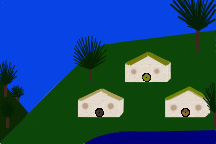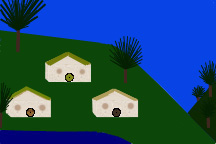 |
|
 |
 |
|
 |
Concerning Hobbits> Meanings of Hobbit Names | Calendars & Chronologies | Shire Library | Shire Geography | Mathom House (Misc) | Home
Tolkien puts an interesting spin on his stories by writing as if he were the translator and not the creator of the Lord of the Rings. The real names of the hobbits would sound foreign to us, but since Tolkien wrote from the hobbit viewpoint, he wanted the names to sound familiar. Because of this, he picks names that carry the flavor of the original names.
If names have meanings, they are usually relevant to the fiction. However, many associations are only by chance. For example,
Tolkien denied that Sauron came from the Greek thaura "detestable" or saura "a lizard." Tolkien said people often got confused
between the meaning and the historical constructions within the stories, versus the meaning outside the stories. So one must be
careful when listing what the names mean. However, Tolkien did say that he used Anglo-Saxon (Old English), for words and
names for the Mark and did not use Anglo-Saxon for any other language, except for some hobbit-dialect words. So here are
some possible meanings:
Bilbo: Tolkien said that many male hobbit names had lost their meaning, and he specifically cites the name "Bilbo." However, it is interesting to note that in the Oxford English Dictionary, "Bilbo" refers to a sword that came from Bilbao, Spain. In the stories, Bilbo has Sting for part of the time. But perhaps that is a coincidence.
Frodo: Tolkien said that Frodo's real name in the hobbit language is "Froda," since to hobbits, "-a" is the masculine ending and "-o" and "-e" are feminine. In Beowulf, Froda was the king of the Heathobards, who had a feud with the Danes that they tried to settle. In Old English, "fr�d" means "wise, prudent, sage." "Freoda" means "protector, defender." "Freodo" means "peace, security." Frodo does bring peace to all the Free Peoples by getting rid of the Ring.
Gollum: In Old Norse, "gull" means "gold," and in the oldest works it is "goll." If inflected, it could be "gollum" meaning "gold, treasure, something precious." It can also mean "ring." Gollum is obsessed by the golden ring.
Samwise: Tolkien explained where he got Sam's name. Sam was really called "Ban" which was short for "Banaz�r." It meant "halfwise, simple." To keep the meaning but make the name sound familiar to us, Tolkien called him Samwise, from "samw�s." In Old English, "sam w�s" means "half wise."
Sm�agol: In Old English, "smeah" is "penetrating, creeping."
Carpenter, Humphrey (Ed.). (2000, 1981). The Letters of JRR Tolkien. New York: Houghton Mifflin.
Kennedy, Charles W. (trans). (1940). Beowulf: The Oldest English Epic. New York: Oxford University Press.
Noel, Ruth S. (1980). The Languages of Tolkien's Middle-earth. Boston: Houghton Mifflin Company.
Oxford English Dictionary: Volume I - A-B. (1961,1933). Oxford: At the Clarendon Press.
Tolkien, JRR. (1994). "Appendices." The Lord of the Rings. New York: Houghton Mifflin.
Visit "Concerning Hobbits"
Visit our smial (home)
May 3, 2004
Updated January 3, 2102